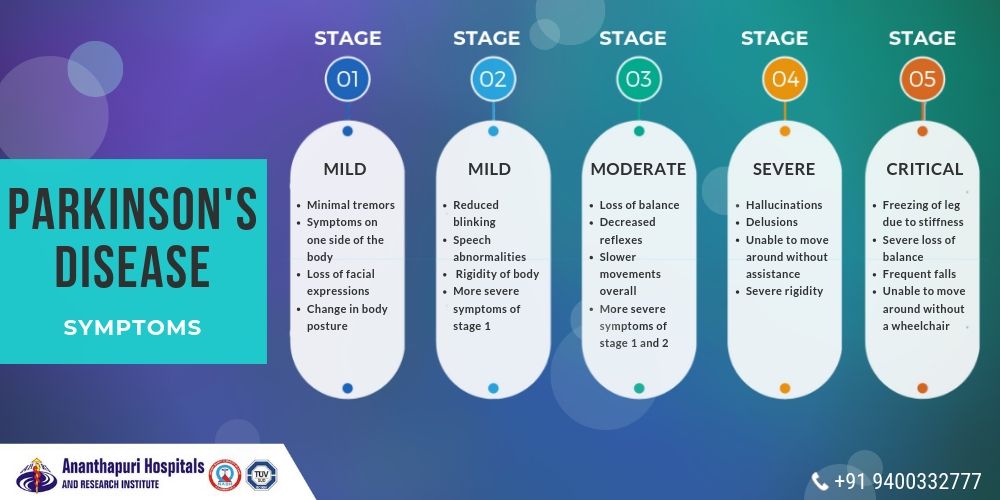- 04/September/2019

Parkinson's Disease - Ananthapuri Hospitals, Trivandrum
It was in 1996 that a trembling hand held the Olympic torch in Atlanta, one of the most defining moments in sports history! The trembling hand belonged to none other than the greatest boxer in the world - Muhammad Ali! And why was it trembling, you ask?
Muhammad Ali was diagnosed with Parkinson's Disease in 1984, three years after his retirement from boxing. He spent the last years of his life raising public awareness of this weakening neurological disorder that affects millions of people around the world.
To understand this disease better - imagine a person who is independent, suddenly finding tasks like drinking coffee much more difficult - because of tremors. Yes, living with Parkinson’s disease can be challenging but early detection can help minimise the symptoms. Parkinson’s mostly affects people above 60 years of age, but it is found in middle-aged people as well.
Know more about Parkinson's disease by reading some relevant questions that people are most curious to know about!
-
What is Parkinson’s Disease and how does it start?
Parkinson’s disease is a serious and chronic condition that affects the dopamine-producing nerve cells in the brain - called neurons - which control movement. As a result, the neurons die and the dopamine level decreases. This causes abnormal brain activity, thereby leading to symptoms of Parkinson's disease. There are five stages of Parkinson’s disease. It is more likely to be treated successfully if diagnosed during the earlier stages.
2. What are the five main signs of Parkinson’s disease?
The five cardinal signs of Parkinson’s disease include:
- Slowness of movement or bradykinesia
- Tremor
- Rigidity or stiffness of the limbs
- Postural instability or leaning posture
- Lack of coordination and balance
3. What causes Parkinson’s Disease?
The cause of Parkinson's disease is unknown, but researchers have identified several factors that play a role, including:
- Genes - Specific genetic mutations can cause Parkinson's disease. But these are only found in rare cases with many family members affected by Parkinson's disease.
- Environmental factors - Exposure to certain toxins or environmental factors may lead to Parkinson's disease, but the chances are relatively less.
4. What are the symptoms associated with the five stages of Parkinson's disease?
There are five stages of Parkinson’s disease. They vary with types and intensity for different individuals with every stage. If not managed properly at an early stage, the symptoms gradually develop and worsen with every stage.
Stage 1: Mildest form
- You may experience slight twitching (tremors) and trembles. Symptoms are minimal and don’t interfere with your daily tasks. During this stage, Parkinson’s may affect only one side of your body. Your posture, walk, or facial expressions may change
- During this stage, prescribed medications may help minimise the symptoms at this stage
Stage 2: Mild form
- Symptoms like stiffness, tremors, and trembling are much more observable. Loss of facial expressions, changes in posture, reduced blinking and speech abnormalities can also occur. You might feel symptoms on both sides of the body at this stage
- During this stage, proper medical management can provide control of your symptoms
Stage 3: Moderate form
- Symptoms are similar to those in stage 2. In addition, you might experience loss of balance and decreased reflexes. Your overall movements become slower and your daily tasks are significantly affected at this stage
- During this stage, medication combined with occupational therapy may help diminish the symptoms
Stage 4: Severe form
- You are likely to experience uncontrollable shaking and tremors. You may see or hear things that do not exist outside your mind (hallucinations). You may tend to believe things that aren’t true, even when presented with evidence (delusions). Your independence may be compromised
- During this stage, a walker or other type of assistive device may help you move around with less effort
Stage 5: Critical form
- Hallucinations and delusions get severe. Stiffness of the legs can cause freezing upon standing and thereby making it hard to stand or walk. Due to loss of balance, you may fall frequently
- During this stage, you may need to use wheelchairs in order to move around better
-------------------------------------------------------
If you experience a combination of symptoms stated above, never ignore them. Treatment for Parkinson’s disease is better when it is identified during its earlier stages. Diagnosis can be difficult, as many of the early signs are much the same to those in other health conditions.
Consult a neurologist if you have any worries or doubts about your physical movement. Although there is no absolute cure to Parkinson’s disease, treatments can help diminish symptoms and increase the quality of your life.
For many years, treatment options have been limited primarily due to drug therapy, whose effectiveness can decrease over time and whose side effects can be significant. Department of Neurology of Ananthapuri Hospitals has additional treatment options, along with experienced medical professionals who are experts in managing and treating various neurological disorders including Parkinson's Disease.
To book an appointment, call us at +91 9400332777 or visit our hospital at Chacka, NH Bypass, Thiruvananthapuram.

